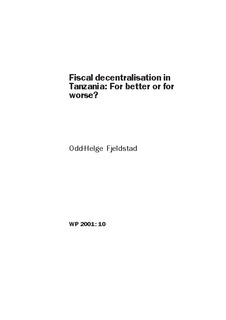| dc.contributor.author | Fjeldstad, Odd-Helge | |
| dc.date.accessioned | 2008-02-26T11:24:17Z | |
| dc.date.accessioned | 2017-03-29T09:12:16Z | |
| dc.date.available | 2008-02-26T11:24:17Z | |
| dc.date.available | 2017-03-29T09:12:16Z | |
| dc.date.issued | 2001 | |
| dc.identifier.isbn | 82-90584-94-6 | |
| dc.identifier.issn | 0804-3639 | |
| dc.identifier.uri | http://hdl.handle.net/11250/2435788 | |
| dc.description.abstract | Tanzania is currently implementing a local government reform aimed at improving public service delivery. An important component of the reform is to increase the fiscal autonomy of local authorities. This policy is encouraged and partly initiated by the donor community. The purpose of this article is to explore to what extent we can expect that increased fiscal autonomy will improve the efficiency and responsiveness of the public sector. The paper concludes that it is unrealistic to expect that the present administration in many local authorities in Tanzania has adequate capacity and the required integrity to manage increased fiscal autonomy. In fact, there is a real danger that, in the absence of substantial restructuring of the current tax system combined with capacity building and improved integrity, increased autonomy will increasemismanagement and corruption. | |
| dc.language.iso | eng | |
| dc.publisher | Chr. Michelsen Institute | |
| dc.relation.ispartofseries | CMI Working paper | |
| dc.relation.ispartofseries | WP 2001: 10 | |
| dc.subject | Local government | |
| dc.subject | Decentralisation | |
| dc.subject | Taxation | |
| dc.subject | Tax administration | |
| dc.subject | Tanzania | |
| dc.subject | JEL classification: H71, O18, O23, R51 | |
| dc.title | Fiscal decentralisation in Tanzania: For better or for worse? | |
| dc.type | Working paper | |
